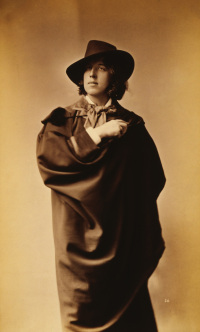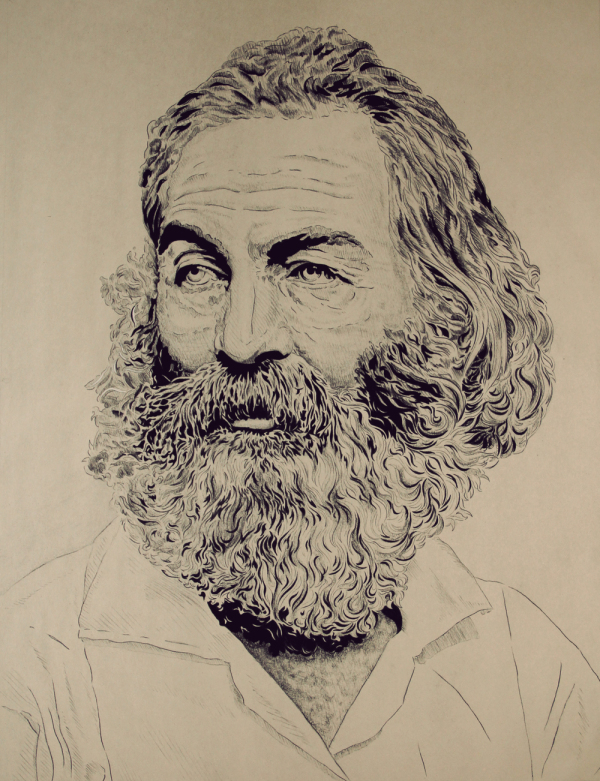Artwork by DAVID RICE
WIKIPEDIA: Oscar Wilde: Wilde met Whitman in America in 1882 and wrote to the homosexual-rights activist George Cecil Ives that there was “no doubt” about the great American poet’s sexual orientation—”I have the kiss of Walt Whitman still on my lips”, he boasted.[133
THE TOAST: Because mine is an evil and a petty mind, suitable more to wallowing in the sordid sexual goings-on of literary giants than in reading their work, I take every opportunity I can to inform people who may not have known that Walt Whitman and Oscar Wilde almost certainly had sex in 1882. You are either the kind of person to whom this matters a great deal, or the kind of person to whom it matters not at all. To the latter I say: yours is the narrow road and the straight, and I extend to you a hearty and fulsome handshake, as well as my sincerest wishes for your continued good health. To the former I say: Want to hear about the time Walt Whitman and Oscar Wilde (probably) hooked up?? Of course you do. You’re my kind of person. Why do we ever talk about anything else? Let’s never do that again.
So. As you may or may not know, Wilde went on a speaking tour of America in 1882, and it was marvelous (Henry James didn’t care for it; Henry James called him a “tenth-rate card” and an “unclean beast”; Henry James can go suck an egg). He lectured  and gave interviews and he sold out concert halls and he very possibly had sex with Walt Whitman. If you have not already read Neil McKenna’s nearly-perfect biography, The Secret Life of Oscar Wilde (Indiebound | Amazon), please correct this omission as quickly as possible. I will now quote from it at length:
and gave interviews and he sold out concert halls and he very possibly had sex with Walt Whitman. If you have not already read Neil McKenna’s nearly-perfect biography, The Secret Life of Oscar Wilde (Indiebound | Amazon), please correct this omission as quickly as possible. I will now quote from it at length:
Oscar desperately wanted to meet Walt Whitman, whom he and many others considered to be America’s living poet…Whitman’s poetry spoke of the potency of friendship and love between men, particularly between working-class men, and positively oozed homoeroticism. Indeed, the ‘Calamus’ section of Whitman’s great poetic cycle Leaves of Grass was so intensely homoerotic that it gave rise to the short-lived term ‘calamite’ to denote a man who loved men. Swinburne was to denounce ‘the cult of the calamus’ and ‘calamites.’ MORE
RADIO TIMES: The new opera Oscar, about the life of legendarily flamboyant writer, Oscar Wilde, is billing itself as the first openly gay opera in history. The show is currently running at Opera Philadelphia, so today we are joined by the star of the show, famed countertenor DAVID DANIELS, who plays the shows titular character. We’re also joined by Oscar’s composer, THEODORE MORRISON, and by Oscar Wilde historian, JOHN COOPER. MORE
THE NEW REPUBLIC: In January 31, 1882, a partially paralyzed man living with his brother and sister-in-law in a row house in Camden, New Jersey, wrote to a friend to tell him of a recent visitor to that home. “He is a fine large handsome youngster,” the man wrote of that guest. And “he had the good sense to take a great fancy to me.” Thus Walt Whitman described the day he spent with Oscar Wilde. This meeting between the self-described “old rough” who revolutionized American poetry with his masterpiece Leaves of Grass and the self-anointed “Professor of Aesthetics” who was touring America with a lecture praising sconces and embroidered pillows, has been examined often in the intervening years, usually through the lens of what is now called queer history, or as an interesting, if not particularly consequential, moment in the history of literature. But neither approach takes the true measure of the meeting’s importance. For Wilde didn’t travel to Camden to talk about gender roles or belles lettres. The writer was still years away from becoming the author whose peerlessly witty plays are still staged today. What drew him to Whitman’s home was the opportunity to discuss fame. He wanted to listen to the singer of “Song of Myself”—an older man (Whitman was 62, Wilde 27) with inexhaustible energy, despite his infirmity, for self-promotion. Whitman was an international icon who exploited the fuzzy line between acclaim and notoriety and a media-savvy poet who understood the crucial role of image in the making of a literary career. Wilde didn’t travel to Camden to learn how to be a famous writer. That, he was certain, he would later teach himself. He went to learn how to be a famous person. It would be hard to imagine a more apt pairing of teacher and student. MORE

